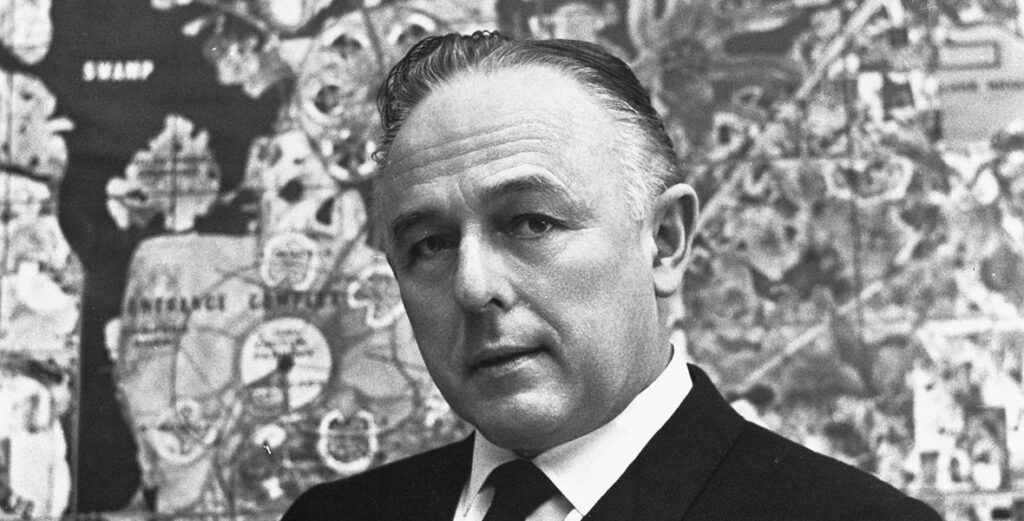In the annals of American business history, few figures loom as large or embody the spirit of audacious deal-making quite like Marvin Davis. At his peak, his net worth was estimated to be a staggering $6 billion, a fortune that placed him among the most influential and colorful tycoons of the late 20th century. Davis was a man of immense appetites and even larger ambitions, a quintessential self-made billionaire who carved his empire from the volatile worlds of oil, entertainment, and real estate. Often dubbed the “Billionaire Wildcatter” for his oil industry roots and aggressive negotiation style, his life story is a masterclass in leverage, vision, and the art of the mega-deal. His financial journey—from the son of a coat manufacturer to the owner of 20th Century Fox and the Beverly Hills Hotel—is a complex tapestry of monumental successes, occasional staggering risks, and an unparalleled knack for buying low and selling high. This deep dive into Marvin Davis’s $6 billion net worth will explore the intricate architecture of his wealth, tracing the flow of capital from dusty oil fields to the glittering gates of Hollywood studios and some of the most valuable real estate on the planet.

Early Life and Formative Years: The Foundations of a Deal-Maker
Marvin Harold Davis was born in 1925 in Newark, New Jersey, to a family already engaged in business. His father, Jack Davis, ran a successful coat manufacturing company, providing Marvin with a comfortable upbringing and an early education in commerce. The family later relocated to Denver, Colorado, a move that would prove fateful for the young Davis. He attended New York University but left before graduating, feeling the pull of the business world was stronger than the academic one. He returned to Colorado and initially joined the family garment business. However, Davis possessed a vision that far exceeded the confines of the apparel industry. He recognized that true, monumental wealth was not made in manufacturing alone but in the strategic control of valuable assets and resources. This innate understanding of asset valuation and leverage became the cornerstone of his philosophy. He learned the art of the deal not in a classroom but at the negotiating table, honing his skills in sales and finance, which prepared him for the much larger plays he would soon engineer in the oil fields.
The Oil Fortune: The Source of the Initial Capital
The foundational pillar of Marvin Davis’s net worth was built upon the black gold of the oil industry. In the 1950s, alongside his father Jack and brother-in-law Kenneth Nathanson, Davis formed Davis Petroleum. His strategy was not that of a traditional wildcatter relying solely on luck. Instead, he employed a shrewd and less risky approach: he acquired mineral rights and leases in proven or highly promising areas, particularly in Wyoming’s Powder River Basin. He would then put together drilling partnerships, syndicating the risk among wealthy investors while retaining a significant working interest for himself. This model allowed him to build a substantial operation without exposing himself to catastrophic failure. The success of Davis Petroleum was spectacular. The company struck numerous productive wells, generating a massive and relentless flow of cash. This oil revenue became the essential fuel for all of Davis’s future ventures. It provided him with the liquid capital necessary to make massive acquisitions and the financial credibility to secure enormous lines of credit from banks, who were eager to lend to a man with such a prolific cash-generating asset. The oil business was the engine room of his entire empire, and the profits from it were measured in the hundreds of millions, providing the springboard for his entry into the glamorous world of Hollywood.

The Foray into Hollywood: Acquiring and Selling 20th Century Fox
With the immense cash flow from Davis Petroleum, Marvin Davis set his sights on a new prize: a Hollywood studio. In 1981, in a landmark deal that shocked the entertainment industry, Davis led a consortium to acquire 20th Century Fox Film Corporation for $722 million. It was a classic Davis move: identifying an undervalued asset with immense hidden potential. At the time, Fox was considered a sleeping giant, with a vast library of films and television shows but lackluster recent performance. Davis saw beyond the current balance sheet to the intrinsic value of the content and the real estate. He installed a new management team, including a young Barry Diller, and greenlit projects that would become huge successes, most notably the launch of the Fox Broadcasting Company. However, true to his nature as a deal-maker rather than a long-term operator, Davis did not hold onto the studio for decades. In 1984, just three years after buying it, he sold a 50% interest in Fox to oilman Rupert Murdoch for $250 million. A year later, he sold his remaining stake to Murdoch for another $325 million. In total, he netted a profit of over $300 million from the buy-and-sell transaction. This deal exemplified his core strategy: use cash to acquire an undervalued asset, enhance its value through strategic management, and then sell it for a monumental profit, recycling the capital into the next opportunity. The Fox deal alone would have been a career-defining achievement for most, but for Davis, it was just one chapter.
Real Estate: The Pillar of Perpetual Wealth
If oil was the engine and Hollywood the glamour, real estate was the bedrock of Marvin Davis’s long-term wealth. He had an almost prescient ability to identify and acquire trophy properties, treating them as both luxurious assets and incredibly sound financial investments. His most famous real estate holdings included:
- The Beverly Hills Hotel: Perhaps his most iconic acquisition, Davis bought the “Pink Palace” in 1987 for an estimated $135 million. He poured millions into its restoration, returning it to its former glory and solidifying its status as a haven for the global elite. He later sold it in the 1990s for a significant profit.
- The Pebble Beach Company: In 1990, Davis led a group that acquired the legendary Pebble Beach golf resort and its surrounding properties for $841 million. This included some of the most breathtaking and valuable coastal real estate in the world.
- Aspen Skiing Company: He owned this premier ski resort operator for a period, adding another world-class property to his portfolio.
- Commercial and Residential Properties: His holdings extended to major office buildings and vast tracts of undeveloped land, particularly in California and Colorado.
Davis understood that prime real estate was a finite resource that consistently appreciated over time. These properties were not just vanity purchases; they were strategic stores of value that generated substantial income through operations and could be sold for enormous capital gains, further compounding his $6 billion fortune.
Other Business Ventures and Investments: A Diversified Portfolio
The scale of Marvin Davis’s ambition meant his investments were never confined to a single sector. His $6 billion net worth was the result of a highly diversified portfolio designed to generate wealth through multiple channels.
- Media and Entertainment: Beyond Fox, Davis made a run at several other major companies. He attempted to acquire CBS and was a serious bidder for United Airlines and NFL franchises. While not all these bids were successful, they demonstrated his relentless drive to deploy capital into large-scale, transformative assets.
- Aviation: A man of his stature required immense mobility. He owned a fleet of private jets, including a Boeing 727, which were both tools of his business and symbols of his success.
- Luxury Assets: His lifestyle was legendary. He owned a sprawling mansion in Beverly Hills, famously referred to as “The Knoll,” which was a site of extravagant parties and high-stakes business meetings. His collection of cars and art also represented a significant portion of his liquid assets.
The Davis Method: Leverage, Negotiation, and Personality
A discussion of Marvin Davis’s net worth is incomplete without analyzing his unique methodology. He was a pioneer in the use of leverage. He rarely used only his own money; instead, he used the cash flow from his oil business to secure massive bank loans, allowing him to punch far above his weight in acquisitions. His negotiation style was legendary—blunt, loud, and intimidating, often conducted over massive meals. He was known for his phrase, “Don’t be a schmuck!” which he would yell during negotiations to pressure counterparts. His larger-than-life personality was itself a business tool, creating an aura that often gave him an advantage in deals.
Philanthropy and Personal Life: The Family Legacy
Despite his fierce business demeanor, Davis was also a significant philanthropist. He and his wife, Barbara, donated hundreds of millions to charitable causes, most notably in healthcare. The Barbara Davis Center for Diabetes in Aurora, Colorado, named after his wife, is one of the world’s leading research and care institutes for childhood diabetes, funded primarily by their donations. This philanthropic giving, while substantial, was a calculated part of his legacy-building. On a personal level, he was a devoted family man with five children. His family life provided a stable foundation for his high-flying business endeavors, and he involved his children in his enterprises, teaching them the principles of deal-making.
Later Years and Legacy: The End of an Era
Marvin Davis passed away in 2004 at the age of 79. At the time of his death, his net worth was estimated to be around $6 billion, a testament to his ability to not only build but also preserve wealth across economic cycles. His estate was structured to ensure his family’s financial security for generations. His legacy is multifaceted: he is remembered as a brutal negotiator, a visionary acquirer of assets, a generous philanthropist, and a defining figure of a certain era of American capitalism. He proved that with enough courage, cash flow, and cunning, one could build an empire that stretched from the oil fields to the silver screen.
The Anatomy of a $6 Billion Fortune
Marvin Davis’s $6 billion net worth was not a static number but the result of a dynamic and relentless process of acquisition, value enhancement, and strategic divestment. The fortune was built on a powerful trifecta:
- Oil (Davis Petroleum): The foundational cash generator that provided the capital and creditworthiness for all other ventures.
- Entertainment (20th Century Fox): The high-profile play that demonstrated his ability to execute transformative deals and generate massive profits in a short timeframe.
- Real Estate (Beverly Hills Hotel, Pebble Beach): The stable, appreciating asset base that preserved and grew wealth over the long term, serving as a perpetual money machine.
His life serves as a blueprint for a certain kind of billionaire—the asset-heavy, deal-driven tycoon. Marvin Davis wasn’t just worth $6 billion; he was a perpetual motion machine of finance, constantly moving capital from one undervalued asset to the next, forever building, buying, and selling his way into history.


